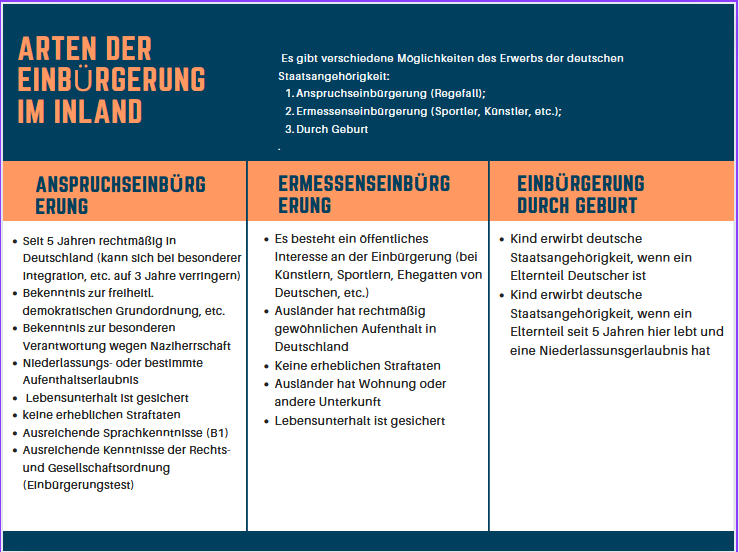Higher Administrative Court of Baden-Württemberg, Decision from April 17, 2019, Case No.: 12 S 1501/18
For individuals to be entitled to legal aid, certain conditions must be met. On the one hand, the plaintiff must prove, by presenting notifications of receiving benefits (e.g., under SGB II or SGB XII), that they are unable to cover the legal costs themselves. On the other hand, the intended legal action must have a prospect of success.
If legal aid is denied by the court, the plaintiff can challenge the decision in a complaint procedure, aiming for the appellate court to agree with their position and grant legal aid.
Facts of the Complaint Procedure
Plaintiff Unable to Learn the German Language Due to Age
In this complaint procedure, the plaintiff filed a complaint with the Higher Administrative Court of Baden-Württemberg against the denial of legal aid. She sought legal aid for a lawsuit seeking naturalization without the requirement to prove the necessary language skills, claiming that, due to her age, she could no longer acquire them.
Decision of the Higher Administrative Court of Baden-Württemberg
The Higher Administrative Court followed the plaintiff’s argument and decided that she should be granted legal aid. According to § 166 VwGO in conjunction with § 114 (1) Sentence 1 ZPO, a party is entitled to legal aid if they cannot afford the costs of legal proceedings and if the intended legal action offers sufficient prospects of success. It is not necessary for success in the proceedings to be certain; sufficient prospects exist if success is just as likely as failure.
Court Decided That Legal Aid Should Be Granted Because the Outcome Was Uncertain
For the granting of legal aid, it is sufficient if the outcome of the proceedings is uncertain, meaning that an evidentiary hearing might be necessary, and there are no indications that would render such a hearing hopeless. Difficult, unresolved legal questions must not be decided in the legal aid procedure.
In this case, the conditions for legal aid were met. The contentious issue of whether the plaintiff was unable to meet the requirements of § 10 (1) Sentence 1 Nos. 6 and 7 StAG due to her age remained open. The legislator deliberately provided an exception in § 10 (6) StAG for individuals unable to meet the heightened language requirements due to age.
Court Recognized Age-Related Reasons for the Inability to Learn the German Language
Age-related reasons, which must be assessed separately from health-related exclusion reasons, consider that the ability to acquire new knowledge typically diminishes with age. Age is an indicator of whether the foreigner is still capable of acquiring the necessary skills. However, there is no strict age limit; instead, all relevant personal circumstances must be considered in an individual assessment.
Personal Circumstances of the Plaintiff Indicate Reasons for Inability
In the case of the 64-year-old plaintiff, there were indications that she was no longer able to acquire the required language skills due to her personal circumstances. The plaintiff was illiterate, had worked only a few years after raising her children for many years, and had been permanently incapacitated for work since 2011. Additionally, she had performed very poorly in past language tests, and there was no reason to believe that she could now acquire these skills. Moreover, the plaintiff had been receiving medical treatment for years for numerous ailments that had further accelerated the aging process. The existing medical records suggested that it would not be possible for the plaintiff to acquire the required knowledge due to her age.
Therefore, it was unnecessary to obtain an additional expert opinion to establish the plaintiff’s inability. The authority could not claim that the plaintiff failed to cooperate by not obtaining such an opinion.
Cost Issue and Fee Reduction
It was doubtful whether the authority could make the obtaining of an expert opinion dependent on the payment of an advance fee. § 38 (2) StAG provides for a flat fee for naturalization, and the possibility of a fee reduction or exemption is available. Since the costs of naturalization had already been considered, an additional reimbursement of expenses was excluded. However, in this case, there was no need to obtain a costly expert opinion.

Source: Higher Administrative Court of Baden-Württemberg
Important Note: The content of this article has been prepared to the best of our knowledge and belief. However, due to the complexity and constant evolution of the subject matter, we must exclude liability and warranty. Important Notice: The content of this article has been created to the best of our knowledge and understanding. However, due to the complexity and constant changes in the subject matter, we must exclude any liability and warranty.
If you need legal advice, please feel free to call us at 0221 - 80187670 or send us an e-mail to info@mth-partner.de
Lawyers in Cologne advise and represent clients nationwide in immigration law.

